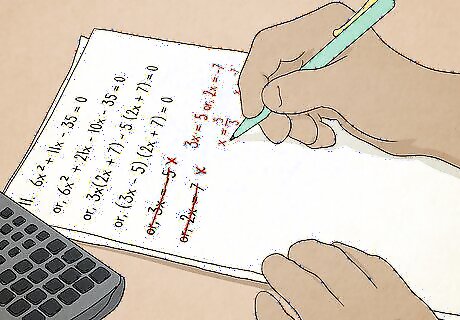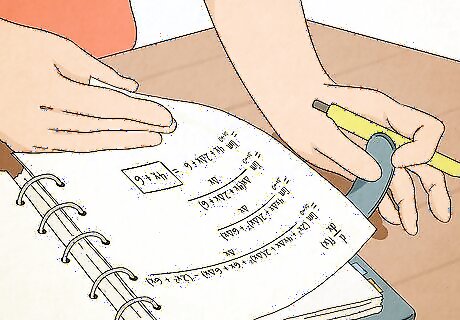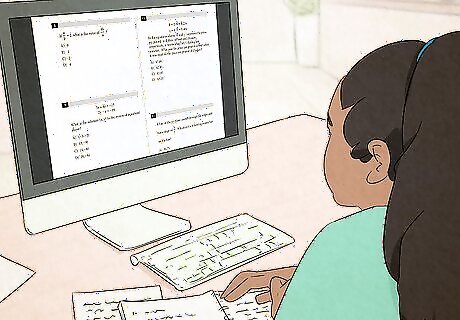
views
At School

Sit in the front of the classroom to maintain your focus. It’s cliché, but sitting in the front of the class really does make a world of difference. If you have open seating, just start showing up a little early and grabbing a seat in the front row. If you don’t, ask your teacher to be reseated near the front. It will be much easier to focus if there isn’t anything interrupting your view of the teacher and whiteboard. It’s easy to get lost in math if you lose track of what’s going on. Sitting near the front will make it easier to track what’s going on as your teacher explains how to do a new type of problem. If there are any unruly students in your class, sitting up front will also keep you from getting roped into their shenanigans. Try to sit at an angle so you aren’t looking directly at the clock. If the clock is staring you right in the face, you may end up obsessing over class getting out instead of focusing on the lesson.

Listen actively to your teacher. You won’t keep up in class if you aren’t listening to the teacher. If you aren’t writing something down, keep your eyes on the teacher while they’re lecturing. Look at your classmates whenever they ask or answer a question. This will keep you engaged in what’s going on and you’re less likely to fall behind if you aren’t getting distracted or staring off at something in the background. Looking at your teacher when they speak will also show them that you’re making an effort to stay focused. If it ever gets to the point where you need them to give you the benefit of a doubt on a passing grade, you’re more likely to get the grade if they’ve seen you paying attention.

Take notes on everything your teacher writes down on the board. You don’t need to write down every single thing that comes out of your teacher’s mouth. In fact, your notes will be a chaotic mess if you do this! Instead, jot down everything your teacher puts on the board. They’re putting it there for a reason, and it will be much easier to review and study if you have all of the essential information in your notes. For each new skill, break the process down into steps in your notes. Then, add bullet points under each step with explanations and examples your teacher provides. It’s much easier to memorize a process or equation if you can turn it into a 4- to 5-step formula. Highlight new vocab terms. There are tons of unique vocabulary terms in math, and highlighting the new words you learn will make them easier to find when you’re flipping through your notebook trying to remember “denominator” or “ratio” means.

Raise your hand whenever you feel lost in class. Too many students lose track of what’s going on in math class and don’t speak up, which only makes them more confused as the material gets more complicated! If your teacher says something that kind of goes over your head, raise your hand and ask them to re-explain or provide an example. For example, you could just say, “Ms. Smith, I’m not really sure how you know which side of the triangle is the hypotenuse. Can you explain that again?” or, “Mr. Bates, I still don’t really understand the difference between rational and irrational numbers. Is there an easier way to figure out which ones are rational?” Even if you do this every class, your teacher won’t get annoyed. Teachers want to know if their students aren’t understanding something.

Ask your teacher about getting help outside of class. If you’re in high school or grade school, ask your teacher if they offer after-school study sessions or tutoring. If they don’t, ask if you can meet with them during lunch to review homework or do practice problems. This is especially important if you’re a little behind and you’ve struggled with previous math classes. There’s nothing wrong with getting extra help when you need it. In fact, it takes bravery and courage to acknowledge you need help! Unlike a lot of other subjects, math is cumulative. So, if you struggled with pre-algebra in grade school, freshman algebra I might be a tough class for you. Your teacher will be able to spot those foundational gaps and help you fill them in. If you’re a college student, go see your professor during their office hours. Professors don’t get nearly as many visitors as they’d like during office hours, and they’ll be more candid and open to giving you meaningful direction if you chat with them in their office. EXPERT TIP Joseph Meyer Joseph Meyer Math Teacher Joseph Meyer is a High School Math Teacher based in Pittsburgh, Pennsylvania. He is an educator at City Charter High School, where he has been teaching for over 7 years. Joseph is also the founder of Sandbox Math, an online learning community dedicated to helping students succeed in Algebra. His site is set apart by its focus on fostering genuine comprehension through step-by-step understanding (instead of just getting the correct final answer), enabling learners to identify and overcome misunderstandings and confidently take on any test they face. He received his MA in Physics from Case Western Reserve University and his BA in Physics from Baldwin Wallace University. Joseph Meyer Joseph Meyer Math Teacher Review basic concepts before diving into advanced topics. Identifying the gaps in your knowledge helps you avoid difficulties later on. Take an assessment or get your teacher's advice on where you can improve. Practice targeted exercises to build a strong foundation so you can confidently tackle new lessons.
Outside of School

Review your notes every day to commit the info to memory. It’s hard to internalize the information you receive in class if you never open your notebook back up to review your notes. Every day, spend at least 5-10 minutes re-reading your notes for the day. This is one of the best ways to memorize key vocab terms, track what’s going on from class to class, and keep the information fresh in your head. Commit key formulas to memory, but make sure you know what the variables stand for. If you’ve just learned πr² as the formula for calculating the area of circles, say “pi times the radius squared, which means you multiply it by itself.” This way, you’ll have an easier time comprehending how the formula actually works when you need to use it. This also gives you an opportunity to refresh your memory before you complete any homework that were assigned that day.

Give every assignment a shot without looking online for help. Even if it chews through an extra 30-45 minutes, try to do your homework without Googling for hints and answers or skipping through your notes looking for the steps. This will challenge you to flex those critical thinking skills and you’re more likely to actually absorb the information if you can arrive at the correct answer on your own. Try to do your homework on the day it was assigned. You’re more likely to forget about something due next week if you give yourself 4-5 days to forget about it! It’s totally okay to refer to your notes if you can’t figure it out the first time. The goal here isn’t to make things hard, but to try and help you work through each problem on your own. Don’t use one of those homework calculator apps. Yes, you might get the right answer, but those apps are often wrong and the teacher will be able to tell you’re using one if you don’t show your work. You also won’t learn anything!

Look over your work when you get it back to understand your mistakes. Whenever your teacher gives you homework, quizzes, or tests back, don’t stuff it in the folder and forget about it. Review your work and see what you got wrong. It may not feel good to see red marks on your paper, but looking at what went wrong will help you identify what you need to fix in the future. If you look at wrong answers and immediately see what you did wrong, you probably aren’t reading the directions carefully enough. If there were any questions that you thought you got wrong and your suspicions are confirmed, don’t get down about it. It’s actually a good sign. This means that you’re self-aware! Next time, trust your instincts and spend that extra 5 minutes reviewing your answers to the questions you aren’t confident on.

Keep your math folder clean and organize your notes. Don’t let old useless papers take up a ton of space in your backpack. Throw out anything that isn’t going to help you complete future assignments. Organize your folder and notes so that you have everything you need in one place. If your notebook is super cluttered or covers multiple subjects, get a new one and only use it for math. Compartmentalizing your work will make it much easier to track things over time. For example, you could keep the left side of your folder for previous work from the unit you’ve been given back to help you study later and leave the right side of the folder for work that you need to turn in. For your notes, you could use the front of your notebook to take daily notes and work your way from the back of the notebook forward to jot down key formulas and definitions.

Spend extra time studying for math in the week leading up to tests. Show up for any after-school study prep your teacher offers, and use any study halls you have to brush up on your test. Review your notes to make sure you have everything covered for the unit you’re being tested on. If you can, spend extra time every night quizzing yourself and practicing. This way, when it comes time for the exam, you’ll feel prepared and ready. Make lists of the key formulas and definitions you need to know for the exam. Memorize them if you aren’t going to have a key during the test. Test yourself by trying to explain when and why you use each formula. Use the prep materials your teacher gives you. If they pass out a study guide or a practice test, complete the practice problems and review the information. This will give you the best sense for what’s going to be on the exam.

Take advantage of any optional assignments and extra credit. If your goal is to pass math, getting all of the free points and practice that you can is one of the best ways to do it. If your teacher offers extra credit regularly, treat it the same way you would a regular homework assignment and force yourself to turn it in. If your teacher doesn’t offer any extra credit but you aren’t doing as well as you’d like, ask them. Teachers will occasionally throw you some extra credit if you ask.

Hire a tutor to brush up on your skills and tackle homework. If you can, hire a math tutor. Meet with them once or twice a week and complete your homework with them. Ask them to challenge you with practice questions and review concepts from class. This is a great way to master the foundational skills you need to perform well, especially if you’re struggling with advanced math. If you live at home or you’re in grade or high school, don’t worry about asking your parents about getting a tutor. They may not be thrilled your grades are lagging a bit, but they’ll be proud of you for asking for help. If you’re in college, most schools have some kind of peer-tutoring program that’s free for students.

Complete practice questions in your spare time to brush up. Whenever you have some time to kill, quiz yourself! Go online and search for quizzes and games focused on the subject you’re struggling with. There are tons of free resources out there and the more you practice, the more you’re going to improve. Khan Academy is the most popular free resource out there for a reason. They have a ton of free lessons and quizzes for almost every math concept out there. Math Is Fun is another great online resource that combines short explanations with interactive questions. Art of Problem Solving is a great platform if you strictly want instruction. They offer free lectures and courses for everything from 3rd to 11th grade math. Math.com is a popular resource for foundational skills. There are tons of questions and challenges on their site, although there isn’t a lot of high-level stuff on there. EXPERT TIP Joseph Meyer Joseph Meyer Math Teacher Joseph Meyer is a High School Math Teacher based in Pittsburgh, Pennsylvania. He is an educator at City Charter High School, where he has been teaching for over 7 years. Joseph is also the founder of Sandbox Math, an online learning community dedicated to helping students succeed in Algebra. His site is set apart by its focus on fostering genuine comprehension through step-by-step understanding (instead of just getting the correct final answer), enabling learners to identify and overcome misunderstandings and confidently take on any test they face. He received his MA in Physics from Case Western Reserve University and his BA in Physics from Baldwin Wallace University. Joseph Meyer Joseph Meyer Math Teacher When doing practice problems, promptly check to see if your answers are correct. Use worksheets that provide answer keys for instant feedback. Discuss answers with a classmate or find explanations online. Immediate feedback will help you correct your mistakes, avoid bad habits, and advance your learning more quickly.
















Comments
0 comment